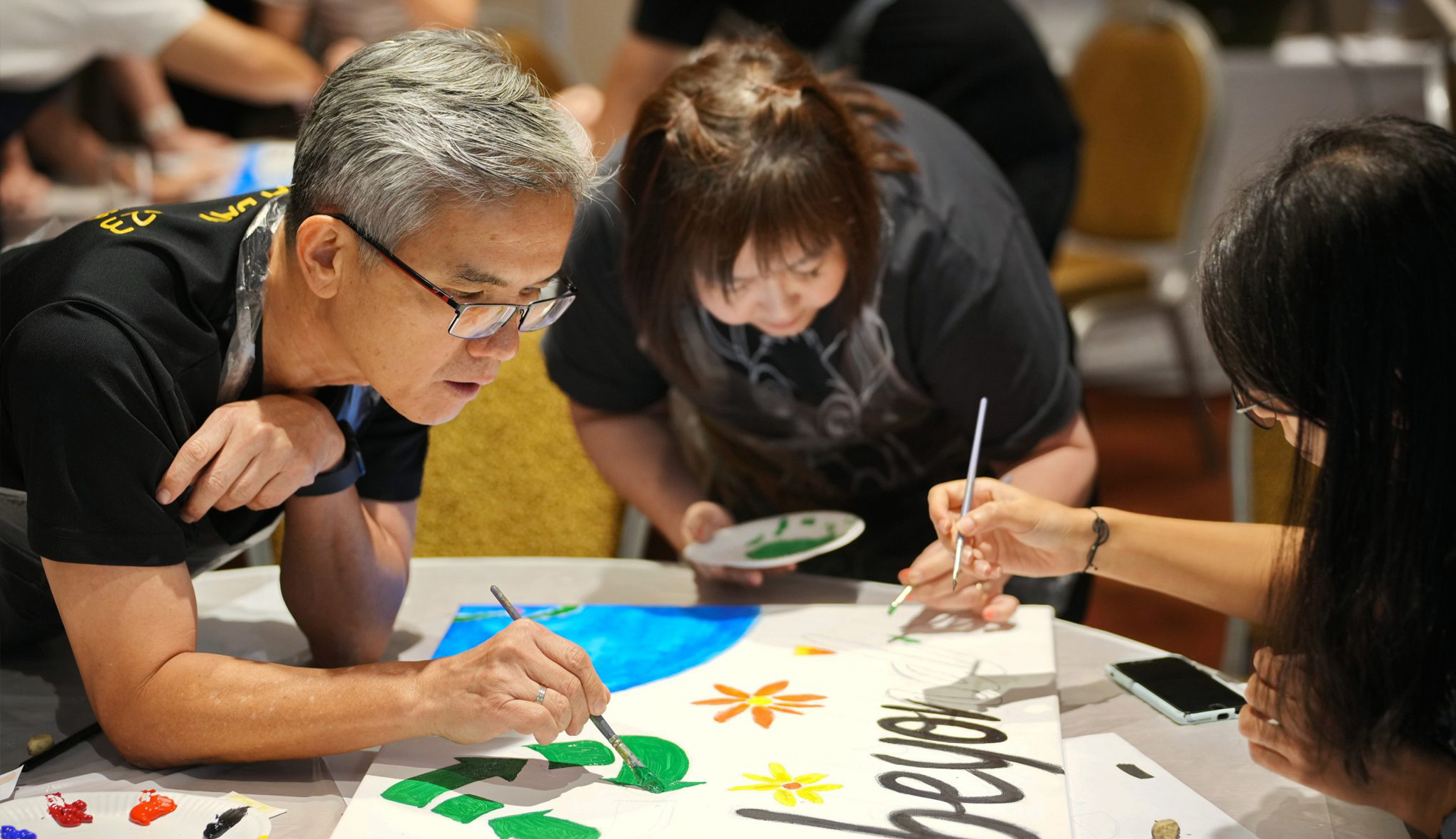Acrylic Painting on Canvas Team Bonding Art Jamming Singapore Visual Arts Centre

























艺术生日派对-DIY粘土主题. 孩子的生日快到了,每年策划一次生日聚会是一项艰巨的任务。 您总是想想出一些特别的东西来让孩子们的经历难以忘怀。 今年尝试一些独特的东西怎么样? 邀请生日孩子的朋友来制作属于他们自己的DIY粘土! 这是一项有趣的活动,每个孩子都会收到不同颜色的 DIY 粘土,用自己的双手雕刻他们最喜欢的动物、植物或家人和朋友。 有些孩子甚至可能想用 DIY 粘土来讲一个小故事。 他们可以与自己的作品合影并带回家留作纪念。 这项活动不仅激发了孩子们的创造力,还教会了他们一些动手制作的技能。 这听起来是一个生日派对的绝妙主意,所以今年让我们来一个 DIY 创意主题吧! 快来给孩子们举办一场令人印象深刻、无比欢乐的艺术生日派对吧!





10 Penang Road 01-02 Dhoby Ghaut Green Singapore 238469
视觉艺术中心的工作室位于多美歌地铁站上方,周围环绕着郁郁葱葱的绿树,享有宁静的公园环境。 工作室宽敞明亮,采用玻璃外墙设计。 外面就是公园环境,是孩子们玩耍的好地方。 在这样宁静又充满活力的环境中为孩子们庆祝生日确实是一个不错的选择。
140 Paya Lebar Road 03-04 AZ
@Paya Lebar Building Singapore 409015
此外,视觉艺术中心还有另一个工作室位于AZ@paya lebar。 该工作室也宽敞明亮,绿植点缀,交通便利,停车方便。 这是举办生日聚会的另一个绝佳场地选择。

视觉艺术中心专注于各类艺术生日派对,提供派对场地以及艺术主题生日派对策划服务。 在生日聚会活动期间,视觉艺术老师在整个绘画活动中提供指导。 一些以艺术为主题的生日派对选项包括DIY粘土艺术派对、T恤绘画派对、手提袋绘画派对、蜡染染色派对、丝巾绘画派对、丙烯绘画派对、扇子绘画派对、水彩画和城市素描派对。 欢迎随时与我们联系,我们将为您打造独特而特别的生日派对体验。
Have any questions? Please drop us an enquiry form and we'll respond to you as soon as we can!

10 Penang Road,
#01-02 Dhoby Ghaut Green,
Singapore 238469
140 Paya Lebar Road,
#03-04 AZ@Paya Lebar Building,
Singapore 409015
6255 0711
info@visualartscentre.sg
62550711
67332155
Dhoby Ghaut Art Studio
Monday to Sunday: 11am – 8pm
Closed on Public Holidays, except by appointment.
MacPherson [Office & Storage]
By appointment only
Visual Arts Centre is an exhibition gallery and art studio at Dhoby Ghaut Green supported by the National Parks Board and the National Arts Council.
Since its initiation on 31 January 2016, the Visual Arts Centre Exhibition Gallery has hosted over two hundred international and local art and design exhibitions, boasting a diverse range of art styles and programmes.
Email:
info@visualartscentre.sg
Phone:
+65 6255 0711
+65 6733 2155
Featured Courses 推荐课程
Art Immersion 3 Medium Course 综合媒介绘画课
Drawing & Sketching Course 素描课程
Acrylic Painting Course 丙烯画课程
Watercolour Painting Course 水彩画课程
Oil Painting Course 油画课程
Chinese Ink Painting Course
Trial Sessions 试课
Chinese Calligraphy & Ink Painting
Graffiti Spray Painting Course
Portfolio Preparation Course (Process) 作品集 (DSA)
Portfolio Preparation Course (Process) 作品集 (Diploma)
Professional Manga Drawing & Digital Painting Course
Professional Interior Design & Freehand Rendering Course
Outdoor Urban Landscape Sketching Course
Private Art Classes
Creative Kids Art Immersion Course 儿童创意绘画课程
Holiday Art Courses & Bootcamps
2025: Holiday Art Course for Kids & Teens 儿童和青年假期课程
2025 Kids (6-9YO) Holiday Art Course 儿童假期课程
2025 Teens (10-18YO) Holiday Art Course 青年假期课程
2025 Art Competition ( Life in an AI-Era ) Open for Registration!
2025新加坡“AI时代的梦想”儿童与青少年绘画大赛开始报名!
Team Building Art Jamming
Art Jamming Team Bonding Catalogue
Team Bonding
Gala Dinner Art Workshop
Batik Painting Workshop (Mural / Individual)
Graffiti Spray Painting on Canvas Workshop
Kids Birthday Party - Art Jamming
Kids T-Shirt Painting Art Party
Batik Painting Workshop
Graffiti Spray and Paint Workshop
Therapeutic Mental Health Workshops
Art Workshop
Workshops at SAM During SAW 2025
Digital Dreams - Transforming Ideas Into Art
Nude Life Drawing with Artist Guidance
Portrait Life Drawing with Artist Guidance
Chinese Ink Painting
Chinese Calligraphy & Ink Painting
Current & Upcoming Exhibitions
Personal Colour Consultant Certification Course
Venue Hire 场地出租
Hire of Visual Arts Centre Exhibition Gallery @ Dhoby Ghaut
Visual Arts Centre Exhibition Gallery @ Dhoby Ghaut
Visual Arts Centre Gallery and Studio @ MacPherson
Special Art Jamming Themes
Chinese New Year Art Jamming
Art Workshops for Singles and Dating
Women's Day
Labour's Day
National Day
Mid Autumn Festival
Deepavali Art Jamming
Halloween Art Jamming
Christmas Art Jamming
Racial Harmony Day & SG60 National Day Art Workshops
View More
Best Team Building Activity
Art Jamming Team Bonding Catalogue
零基础自助绘画(Art Jamming )工作坊
Kids Art Jamming Birthday Party Workshops
艺术生日派对-DIY粘土主题
Art Birthday Party With Diy Clay
Art Birthday Party With Tote Bag Painting 艺术生日派对-画托特包主题
Birthday Party With T-shirt Painting
艺术生日派对-画T恤衫主题
Art Competition and Affordable Art Fair Workshops
Children and Youth Art Competition 2025 – “Life in an AI-Era”
(Embracing Nature) Children and Youth Art Competition
Workshops & Fair Activities
Venue Hire
10 tips for a successful pop-up flea market event
Beautiful Space in the City Central
A Perfect Art Venue for Hire
What to consider when renting a venue for your fashion shows and pop-ups?
Art Course
Where to learn Professional Chinese calligraphy course in Singapore?
艺术疗愈如何让你心理更健康
Best Professional Art Courses In Singapore
在新加坡哪里能学专业素描/速写、油画、水彩、丙烯、水墨、艺术作品集准备、儿童美术、儿童青少年书法等专业美术绘画课?
在新加坡哪里学习专业书法课程?学习书法对儿童青少年的好处
View More
Art Portfolio Preparation - DSA (Kids)
凭什么,新加坡乌节路寸土寸金的商业宝地竟给国人当画室? 快!带你去看看!
Singapore Holiday 2025 - Learn Digital Landscape Painting and Manga Drawing
成人画画课就在视觉艺术中心
Applying into Art Schools - How does one build an art portfolio?
Others
Best Professional Manga Drawing Drawing Course in Singapore
对南洋画派新加坡第一代艺术先驱作品的印象
定制贵宾晚宴的艺术项目
Art Buzz: How to Appreciate Art?
《纪念刘抗诞辰111周年—刘抗书画遗作展》
10 Reasons to Learn Drawing and Sketching
View More
Art Therapy Course in Singapore!
Overseas Students Art & Cultural Exchange
Commissioning Custom made portraits/nude life by professional artists
FAQs for Art Portfolio Preparation - DSA, Diploma & Higher Education
Click and get to our WhatsApp
In the Batik Introduction Handkerchief Painting workshop, participants will learn the traditional art of batik, a wax-resist dyeing technique originating from Indonesia. The workshop begins with a brief history and overview of batik, highlighting its cultural significance and various techniques. Participants will then observe a demonstration of applying wax with tjanting tools and dyeing the fabric. Following the demonstration, each participant will design and create their own batik handkerchief, applying wax to create patterns and then dyeing their fabric. The workshop concludes with a group discussion, allowing participants to share their creations and reflect on their learning experience.